- +92 333 1127834
- info@courtmarriageinlahore.online
Understanding the Validity of Court Marriage in Islam and Pakistan
Introduction to Court Marriage
Court marriage is a legally recognized union where a couple is officially married through a legal process overseen by a judicial or governmental authority, rather than through a traditional ceremonial context. Unlike traditional marriage ceremonies, which often involve elaborate rituals and cultural practices, court marriages streamline the process to focus on the legalities of the union. In many cultures, traditional marriages are deeply rooted in religious and cultural customs, making court marriages a more straightforward alternative. This type of marriage is particularly significant in countries like Pakistan, where legal validity and adherence to Islamic principles are crucial.
A court marriage begins with the couple registering their intent to marry with the relevant local authorities. This typically involves submitting certain documents, such as proof of identity, age, and marital status. Following this, a marriage license may be issued, allowing the couple to marry within a specified period, usually under the supervision of a government official or a judge. In Pakistan, the presence of two witnesses is required to validate the marriage, aligning the process with Islamic legal requirements.
One of the primary advantages of opting for a court marriage is its universal legal acceptance. A court marriage is considered valid across various jurisdictions, provided it adheres to the legal framework of the place where it was performed. This can be particularly beneficial for couples from different cultural or religious backgrounds, as the secular nature of court marriage transcends specific cultural and religious norms. In Lahore, for instance, where diverse cultural practices coexist, court marriages offer a practical and legal avenue for couples to formalize their union.
In conclusion, understanding court marriage involves recognizing its distinction from traditional ceremonies, acknowledging its legal framework, and appreciating its universal acceptance. By aligning with legal standards and, in contexts like Pakistan, Islamic principles, court marriage provides a practical approach to formalizing matrimonial relationships.
In the Islamic faith, marriage holds a profound spiritual and social significance, underpinned by clear guidelines and principles. At the heart of an Islamic marriage is the “Nikah,” a formal contract that represents a lifelong commitment between two consenting individuals. The sanctity of this contract is paramount, and its execution is meticulously outlined in Islamic teachings.
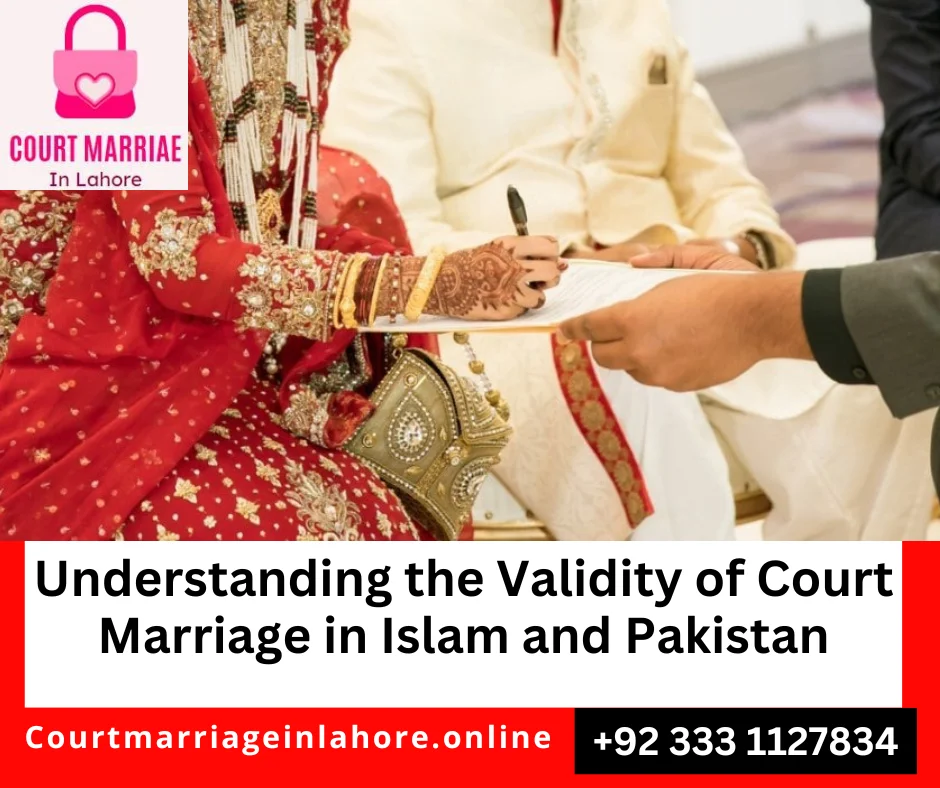
Essential Requirements for a Valid Islamic Marriage
For an Islamic marriage to be considered valid, there are certain indispensable requirements that must be fulfilled. The first and foremost is the mutual consent of both the bride and the groom. Islam places a high value on the willingness and free choice of both individuals entering into the marital bond. Coercion or compulsion is firmly denounced, ensuring that the marriage is founded on genuine agreement.
Another critical requirement is the presence of witnesses during the Nikah ceremony. Typically, at least two adult Muslim witnesses must be present to observe and validate the marriage contract. This stipulation not only imbues the process with a sense of transparency but also fortifies the community’s recognition and support of the union.
The concept of “Mahr” or dower is another integral component of an Islamic marriage. Mahr is a mandatory gift that the groom must present to the bride as a token of respect and financial security. The amount and form of Mahr are agreed upon by both parties and can vary widely, reflecting the socioeconomic context of the individuals involved. It acts as a symbol of the groom’s commitment and responsibility towards his spouse.
Islamic teachings emphasize the welfare, dignity, and mutual respect of both parties in a marriage. It is designed to foster a nurturing and harmonious partnership. The comprehensive guidelines provided by Islam aim to ensure that the marriage is not only legally sound but also spiritually enriching and socially supportive. These principles are deeply rooted in the broader objectives of Shariah, prioritizing justice, consent, and the overall well-being of the individuals.
Court Marriage in Pakistan: Legal Framework
The legal framework for court marriage in Pakistan is meticulously structured under various statutes to ensure that marriage procedures align with both secular and religious guidelines. Key among these statutes are the Family Courts Act of 1964 and the Marriage Act of 1890, which collectively regulate the solemnization and validity of court marriages across the country, including in major cities like Lahore.
The Family Courts Act provides the foundational legal basis for the establishment and jurisdiction of family courts. These courts oversee matters related to marriage, including court marriages, ensuring they comply with legal standards. Under this Act, family courts are empowered to handle disputes and validation processes regarding marital unions, making them critical to the legal framework.
The procedural steps for a court marriage start with the submission of a marriage application to the relevant family court. This application must be accompanied by necessary documentation, including national identity cards, passport-sized photographs, and affidavits declaring the free will of both parties. Additionally, a marriage certificate or Nikah Nama, duly authorized by a Nikah Registrar, must be presented.
Legal officials play a pivotal role in the court marriage process. A Magistrate or Judge of the family court administers the proceedings, ensuring that parties adhere to all legal requirements. The presence of witnesses, typically two, is mandatory to validate the marriage in the eyes of the law. The family court’s role extends to verifying the authenticity of documents and ensuring no party is under coercion or duress.
Official recognition of court marriages by Pakistani law is firmly established. Once the marriage is registered with the family court, it holds the same legitimacy as a religious marriage ceremony. The marriage certificate issued by the court stands as a legal document, affirming the validity of the union within the legal and civil constructs. Thus, understanding the intricacies of this legal framework is crucial for ensuring the smooth processing and recognition of court marriages in Pakistan.
Coexistence of Islamic and State Laws on Marriage
The interplay between Islamic laws and Pakistani state laws regarding marriage is a complex yet fascinating subject. In Pakistan, marriage is a sacred institution that is deeply rooted in Islamic traditions while simultaneously governed by civil laws. This dual-system approach aims to harmonize religious principles with statutory regulations, thereby ensuring the validity of marriages from both a religious and legal standpoint.
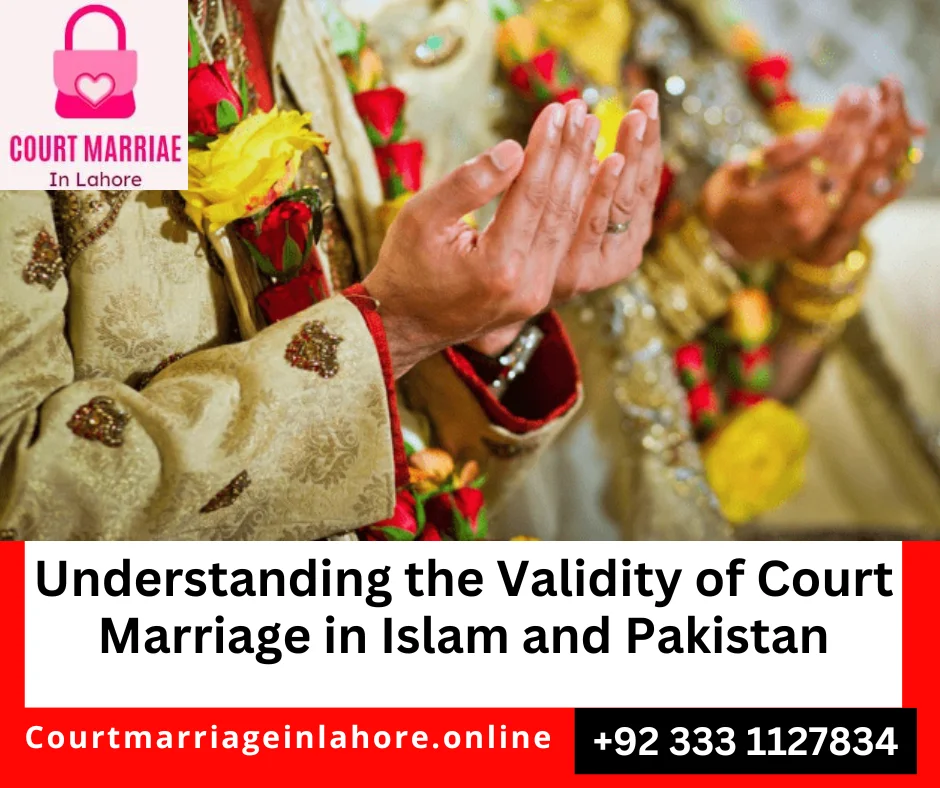
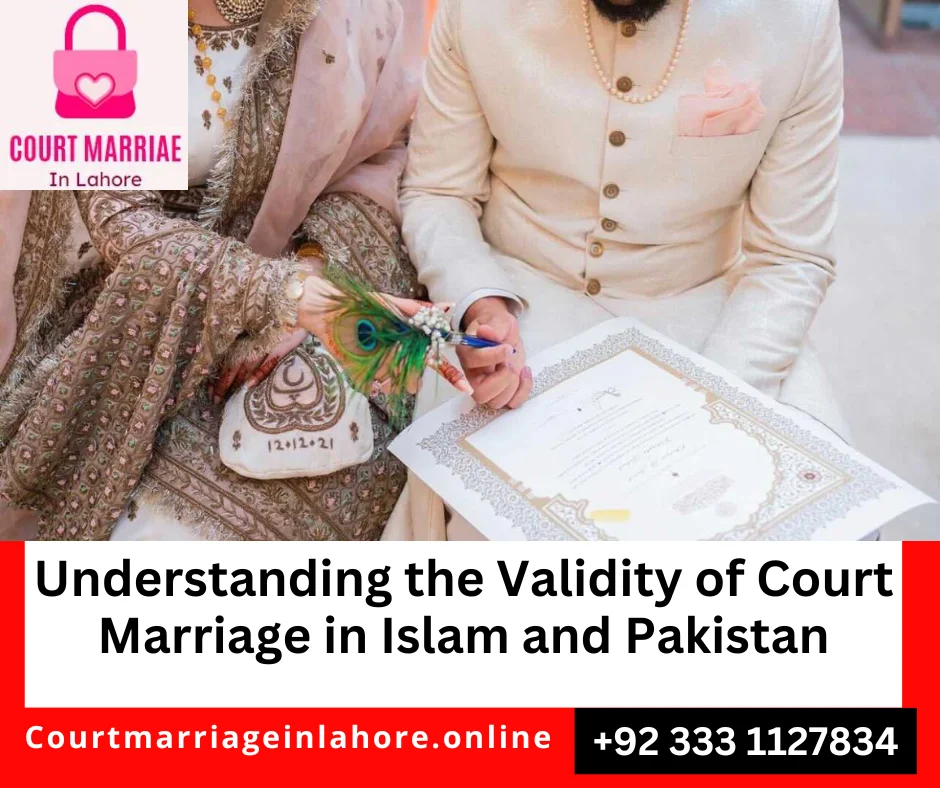
Islamic law, or Sharia, prescribes specific conditions for a valid marriage, such as the mutual consent of both parties, the presence of witnesses, and the payment of Mahr (dower) by the groom to the bride. Pakistani state laws incorporate these Islamic injunctions while also mandating additional requirements such as compulsory registration of marriages. This framework ensures that court marriage is recognized not only under Islamic principles but also under state law, giving it a dual layer of legitimacy.
However, points of contention often arise between Sharia and civil law. One notable example is the marriage age. Under Pakistani civil law, the legal age for marriage is 18 for males and 16 for females. However, under Islamic law, the age of puberty marks the eligibility for marriage, which may occur earlier. Reconciling these differences often involves intricate legal interpretations and adjustments to ensure that both Islamic tenets and state laws are respected.
Legal precedents provide insight into how state and religious authorities have resolved disputes over marriage validity. For instance, the landmark case of “Kanwal Ram v. Himat Bai” addressed the issue of marriage age, blending Islamic principles with state laws to protect minors. Similarly, the Federal Shariat Court has played a pivotal role in shaping policies to align more closely with Islamic values while adhering to constitutional mandates.
Through these examples, it becomes evident that the coexistence of Islamic and state laws on marriage is a dynamic process, shaped by ongoing legal interpretations and societal norms. This delicate balance ensures that marriages conducted in Pakistan, including court marriages, hold both religious sanctity and legal validity.
When it comes to the validity of court marriage under Islamic law, scholarly opinions vary. Islamic jurists and scholars have debated extensively on this issue, leading to a spectrum of perspectives. While some scholars validate court marriages as consistent with Islamic principles, others raise concerns or emphasize specific requirements that must be met for such a marriage to be considered valid.
Supporting Arguments
Many scholars argue that court marriage is legitimate under Islamic law if it fulfills essential criteria such as the consent of both parties involved and the presence of two witnesses. According to these scholars, the formalization of a marriage contract in a court, ensuring public acknowledgment, aligns with the Islamic requirement for transparency and social accountability in marriage. They posit that as long as the marriage adheres to the foundational principles of a nikah, the court procedures merely serve as a modern means of formalization.
Concerns and Criticisms
Conversely, some scholars express reservations about court marriages, primarily focusing on issues of intent and religious adherence. These scholars caution that civil court procedures may sometimes overlook crucial Islamic requirements, such as the presence of a wali (guardian) for the bride. They argue that a marriage conducted solely in a civil court without considering religious guidelines may not satisfy Islamic jurisprudence. Concerns are also raised about the potential for neglecting the mahr (dower), an obligatory marital gift from the groom to the bride.
Balancing Different Interpretations
Balancing these viewpoints requires a nuanced understanding of both Islamic law and the civil procedures in Pakistan. In cities like Lahore, court marriage is increasingly common, but it is crucial to ensure that such marriages adhere to the principles of both civil and Islamic law. Scholars advocating for a middle ground suggest that a court marriage should be supplemented with a religious ceremony to address the concerns about adherence to Islamic principles. This dual approach may bridge the gap between civil formalization and religious legitimacy, fostering greater acceptance among various Muslim communities.
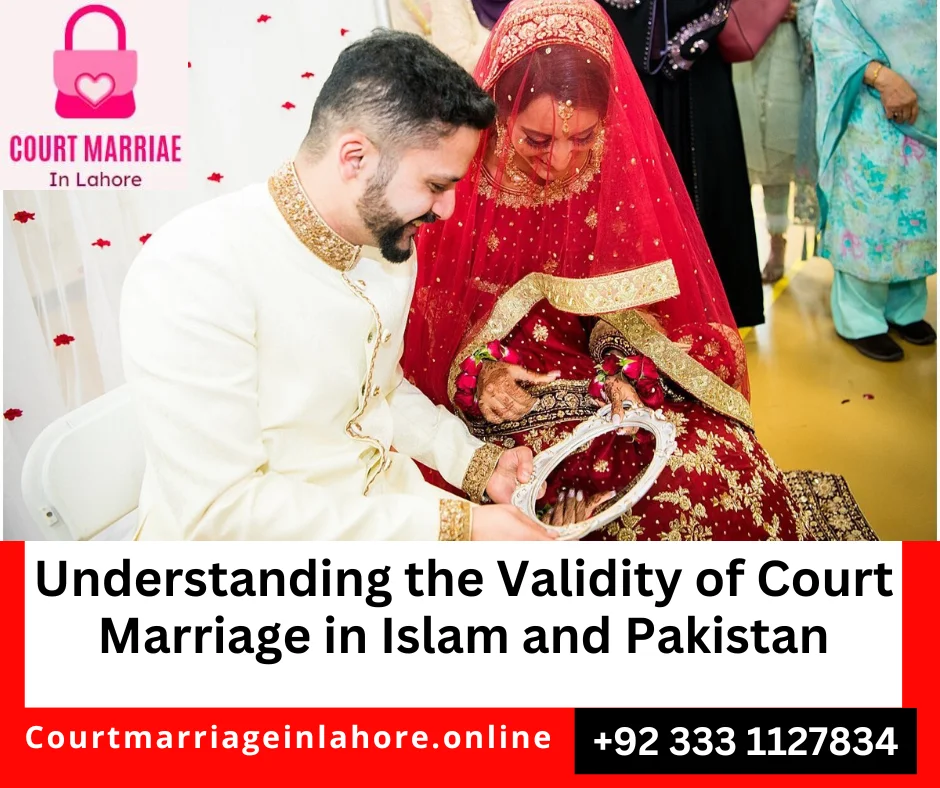
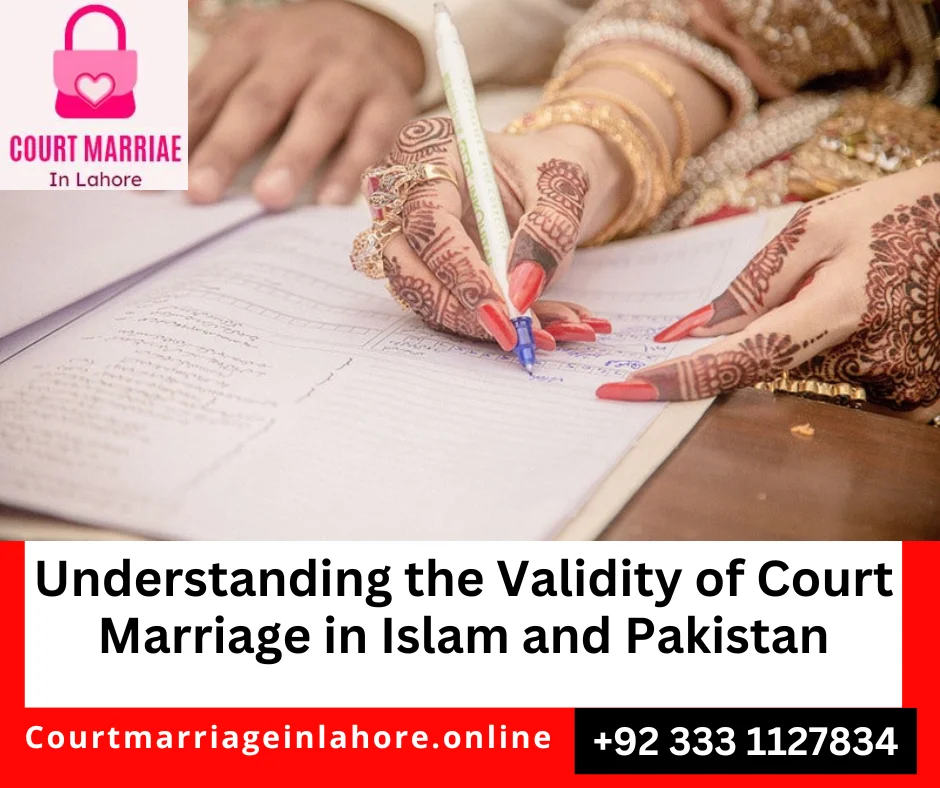
Common Misconceptions and Cultural Influences
In Pakistani society and Islamic communities, court marriages are often met with skepticism, largely due to deeply ingrained cultural biases and societal pressures. One prevalent misconception is that court marriages lack legitimacy compared to traditional weddings. This perspective is often influenced by the cultural importance placed on familial involvement and elaborate ceremonies, which are seen as integral components of a legitimate marriage.
Many individuals in Pakistan and within the Muslim community believe that a marriage conducted without the customary celebrations and parental blessings does not honor traditions. This belief is compounded by the perception that court marriages are a deviation from religious norms. However, within the framework of Islamic law, a court marriage is valid as long as it adheres to the core requirements: mutual consent, witnesses, and mehr (dower). These elements underscore that the legitimacy of marriage in Islam is based on the fulfillment of specific religious criteria rather than the manner or setting in which the ceremony is conducted.
Cultural influences also play a significant role. The traditional view holds that marriage is not just a union between two individuals but an alliance between families. Consequently, a court marriage, which might bypass familial approval or forego a public ceremony, can be perceived as undermining family honor and societal norms. This cultural expectation adds pressure on individuals, deterring them from pursuing court marriages despite legal and Islamic permissibility.
Furthermore, societal misconceptions often reflect gender biases. Women, in particular, may face heightened scrutiny and stigmatization. The notion that a bride must be given away by her family in a traditional ceremony is deeply ingrained, leading to the false perception that a woman who marries through a court procedure is somehow less honorable.
Addressing these misconceptions requires a nuanced understanding of both Islamic jurisprudence and cultural dynamics. Legal reforms and educational initiatives can play a crucial role in clarifying the validity of court marriages, ensuring that they are recognized as legitimate within both religious and societal contexts. It is essential to promote a balanced view that respects traditional values while also embracing legal and religious principles.
Case Studies and Real-Life Examples
Understanding the validity of court marriage holds significant importance for many couples in Pakistan, especially within the realm of Islamic traditions. Real-life examples illustrate how various individuals navigate the process and its outcomes, providing a concrete perspective on this legal remedy.
Take the case of Ali and Fatima, a couple hailing from Lahore. Their families opposed their union due to sectarian differences. Consequently, Ali and Fatima opted for a court marriage. Through this legal pathway, they secured their union’s legitimacy without breaching Islamic principles. Their experience underscores how court marriage can safeguard individual autonomy and ensure that legal procedures conform to religious doctrines. Today, they live peacefully in Lahore, demonstrating the efficacy and validity of court marriage in their context.
Another compelling story is of Samir and Ayesha, who faced financial hardships that prevented an elaborate traditional wedding. Opting for a court marriage allowed them to simplify the process while ensuring compliance with both legal and religious statutes. The couple attested that the court’s formal process provided a structured, less stressful environment. Their journey confirms that court marriage can be a pragmatic solution, particularly when economic constraints are present.
For Zain and Sofia, parental opposition was a significant hurdle due to familial rivalries. By choosing court marriage, they found a legal avenue to formalize their relationship, aligning it with Islamic law’s emphasis on mutual consent and contractual marriage. Their decision provided them protection under the law, and today, they advocate for others in similar predicaments, highlighting the approach’s practicality and emotional relief.
These instances not only showcase diverse motivations behind opting for court marriage but also reassure its alignment with Islamic principles. Each case reaffirms that court marriage is a viable, legally valid choice in Pakistan. The experiences of these couples offer valuable insights, illustrating how statutory and religious considerations can harmoniously coexist, providing essential safeguards and formal recognition to the institution of marriage.
Conclusion: Navigating Court Marriage in Islam and Pakistan
Court marriage is an evolving institution in the context of both Islamic jurisprudence and Pakistani law. As discussed, the validity of court marriage is upheld by Islamic principles, provided the essential conditions, like the presence of witnesses and mutual consent, are met. The sanctity of marriage in Islam emphasizes the importance of these elements, ensuring that a court marriage aligns with religious tenets.
From a legal standpoint in Pakistan, court marriages are recognized and provide couples with a valid and enforceable union under the law. The Pakistani legal system outlines specific procedural requirements, such as registration and attestation of the marriage contract by authorized officials, to guarantee its legitimacy. These steps ensure that the rights of both parties are protected under the jurisdiction of the state.
When considering a court marriage, it is crucial for individuals to balance their religious obligations with legal frameworks. This dual consideration ensures that the marriage is not only spiritually fulfilling but also legally sound. By adhering to both Islamic principles and Pakistani legal requirements, couples can secure a strong foundation for their union.
In modern society, perceptions of court marriage are gradually shifting. The acceptance of court marriage provides a progressive view of matrimonial unions, accommodating the diverse needs of couples. As societal norms evolve, so does the understanding of marriage under both religious and legal lenses.
In conclusion, court marriage in Islam and Pakistan is a legitimate and valid form of union that respects both religious and legal stipulations. Couples are encouraged to seek comprehensive knowledge and guidance, considering their specific circumstances, to navigate this significant life decision with confidence and assurance.
